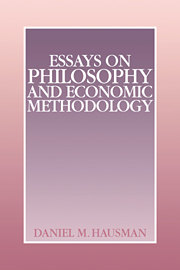Book contents
- Frontmatter
- Contents
- Introduction: What is philosophy of economics?
- PART I METHODOLOGY AND THEORY APPRAISAL
- 1 Economic methodology in a nutshell
- 2 On the conceptual structure of neoclassical economics – a philosopher's view
- 3 John Stuart Mill's philosophy of economics
- 4 The deductive method
- 5 Why look under the hood?
- 6 An appraisal of Popperian methodology
- 7 Is falsificationism unpractised or unpractisable?
- 8 The limits of economic science
- PART II CAUSALITY IN ECONOMICS
- PART III CASES AND PUZZLES
- PART IV POSTSCRIPTS
- Bibliography of relevant writings by Daniel M. Hausman
- Bibliography of works by other authors
- Index
8 - The limits of economic science
Published online by Cambridge University Press: 05 June 2012
- Frontmatter
- Contents
- Introduction: What is philosophy of economics?
- PART I METHODOLOGY AND THEORY APPRAISAL
- 1 Economic methodology in a nutshell
- 2 On the conceptual structure of neoclassical economics – a philosopher's view
- 3 John Stuart Mill's philosophy of economics
- 4 The deductive method
- 5 Why look under the hood?
- 6 An appraisal of Popperian methodology
- 7 Is falsificationism unpractised or unpractisable?
- 8 The limits of economic science
- PART II CAUSALITY IN ECONOMICS
- PART III CASES AND PUZZLES
- PART IV POSTSCRIPTS
- Bibliography of relevant writings by Daniel M. Hausman
- Bibliography of works by other authors
- Index
Summary
When beset with fundamental doubts about the value of their achievements, economists look longingly to philosophy for help. No doubt scientists in other disciplines fiddle with the philosophy of science, too. They oversimplify it in introductory lectures and in introductory chapters of textbooks. They throw it in one another's teeth in the heat of polemical battles. They think seriously about it when they confront new problems that seem peculiar or confusing. But the selfdoubts of economists are exceptional. They are only equalled by those that torment the practitioners of other, even less-developed social sciences.
When times are hard for economic theory – as they are now – (see Bell and Kristol, 1981), economists start boning up their philosophy of science, because they hope that they will be able to trace their difficulties to some simple, but definite methodological error or errors. Economists would, ironically, like nothing better than to discover that they have been methodological boneheads! In that case their ailments would have a definite cure.
By praising the methodological practices of economists, one crushes their hopes for such a philosophical “quick-fix.” One also shows that scientific methods have their limits. Such praise for economists should not be exaggerated. One can, if one wishes, compile a hair-raising catalogue of stupendous methodological stupidities endorsed by and committed by economists. But economists have no monopoly on such gaffs. Einstein and Bohr could revolutionize physics while expounding (but probably not putting into practice) untenable methodological views.
- Type
- Chapter
- Information
- Essays on Philosophy and Economic Methodology , pp. 99 - 106Publisher: Cambridge University PressPrint publication year: 1992
- 2
- Cited by



